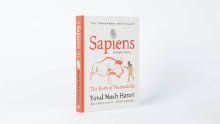Curious to be successful? Read on

Having lunch with Fidel Castro, watching Apollo 13 with the Clinton’s family at the White House, sharing ice-cream with Princess Diana among many more have been the “curiosity conversations” that Brian Grazer has had the opportunity to have in his career of movie production spanning over 30 years in Hollywood. And many of them are covered in his fascinating book, A Curious Mind: The Secret to a Bigger Life, which is an inspiring and an insightful testimonial to the power of curiosity in improving and managing our lives in a better way.
But how often do we ask curious & open questions – in our homes, at our workplaces or the social systems we follow? Do we ask questions with the innocent intent to know? . Curiosity should be as much part of our culture, our educational system and our workplace, the way concepts like “creativity” and “innovation” are. The fundamental technique for curiosity is asking questions, as Brian says “Life is not about finding the answers, but it is about asking the questions.”
Why curiosity matters so much?
Curiosity brings discovery, sparks creativity and inspiration, feeds motivation, self-confidence and tops-up courage & ambition. Brian argues that curiosity is not only a way to learn about the world, it is a “way to change the world.”
But how can curiosity be helpful in your path to success? Here’s what you need to know:
1. Curiosity is a means to discovery and a critical ingredient for innovation and creativity. Curiosity is the “flint from which flies the spark of innovation.” It is the technique that takes you to innovation as it disrupts your point of view. When one talks to people who are tremendously different from oneself in terms of their goals, priorities and values, conversations can expand one’s perspectives by allowing us to look at the world in a very different way. Asking questions allows one to understand how others think about their ideas and helps in getting a deeper understanding about the world.
2. Curiosity is a means to fight fear and overcome rejection. Curiosity makes you learn, improve, increases confidence and manages fears. When your idea gets rejected, be curious to listen to why it happened. You will receive critical insights that you will need to incorporate in the idea itself or in the way you communicate the idea. Questions like “Why have I being told no?” lead you to valuable insights and help you in getting closer to the “yes”. Brian reminds us that rejection can come from the inside too, and curiosity can cure you from your internal doubts as well. If you feel doubtful about an idea you have, asking questions to yourself can help you clear up those fears. “Curiosity will conquer fear more than bravery will,” as poet James Stephens wrote. Asking questions and being curious infuses a sense of possibility. Brian invites the readers to use curiosity when they are worried about something. The idea is about making a case for yourself: Why this project? Why now? Who is the audience? What do we intend to achieve? What budget is needed? Will it be enough? But be aware of the anti-curiosity trap. When you shut down curiosity and you tell the world, “I don’t want to know the reasons why you are saying no,” that time you are closing possibilities.
3. Curiosity is a powerful management tool. Using curiosity as a management tool can be very powerful. It can help you gather insights and information about competition. Walmart’s CEO, Douglas Mcmillon, used curiosity very effectively in his daily meetings with the team by asking everybody in his team “what is our competition doing well?” On the other hand, asking questions can also help empowerment and accountability. When a project is not on track, ask a question to the project lead as to what the plan is in bringing the project back on track? This question implies both the responsibility for the problem and the authority to come up with a solution. Brian further argues that asking is much more powerful than telling, it is the difference about saying “Do this” to “What do you think about doing this?” It creates a space for conversation, a space to accommodate a different idea, a different strategy. If you are the boss and you manage by asking questions, you are laying the foundation of your company and your team. It means you are willing to listen, which will result in more empowerment, engagement and responsibility.
How to make curiosity a practice?
Brian in his book argues that curiosity requires work, even if you are naturally curious. Curiosity requires awareness, planning and discipline, and should be exercised in all kinds of situations, all day long.
The author also introduces the concept of “curiosity conversations,” where one consciously plans to hold conversations with an aim to learn about others in a structured way without a particular agenda but with the genuine intent to know more about the other person’s journey. Such conversations will spark ideas, opportunities and perspective maybe today or tomorrow but will definitely create a discipline that will provide its fruits in the future.
How to set up curiosity conversations?
Curiosity itself should be the motivation to get started, as it requires sincerity of interest about the other person. Here are some tips you can use to start some successful curiosity conversations:
- Start close to home. You can involve your friends, relatives or work colleagues and focus on interests related to their education, upbringing, their beliefs and values. As you start getting confortable to reach out to other people from outside your circle, leverage on your credentials and connections to reach out.
- Specify what you want to talk about. It could be your curiousity about their work or want to learn about their story – be direct, warm but have a layer of formality and respect in all your communications.
- Think in advance what you would like the conversation to be about and a handful of open-ended questions that you will use. What are the things that have influenced you the most in your life? What have been the ingredients for your success? What is the greatest advice you have received? What is the most exciting project you are working on today? Ask questions that cannot be answer with a muted word.
- Do as much research as possible about the person you are going to see as well as their field, that will help you prepare good questions (careful to always keeping privacy in mind). Don’t be slave of your prepared questions. “Be a conversationalist’” as Brian puts it: Listen closely and pick up from what the other person is saying and expand the conversation.
- Pay attention to the answers. Listen and ask more questions, your goal is to learn from others. Don’t share your own story; if you are talking, you are not learning.
- Be respectful with others time. Be on time, close the conversation on time. Don’t take notes during the conversation but make sure you keep a diary of all “curiosity” learning.
- Be grateful and follow the conversation with a thank you note that highlights something you learned or a point that you particularly enjoyed. Don’t ask for anything else. An email or a note should be written in such a way that it doesn’t need a response. If any personal assistant helped you in setting up these conversations, include that person in the thank you note.
- Do curiosity conversations all the time, some planned some unplanned. How about starting a conversation with the person sitting next to you in the flight?
The magic about Brian’s approach to curiosity is to treat questions themselves as valuable, questions that are worth answering. If you treat your questions with respect, you will always listen to the answer with respect.
Go for it: Ask questions until something interesting happens. The craft of a curious mind is to recognize interesting things when they happen!











